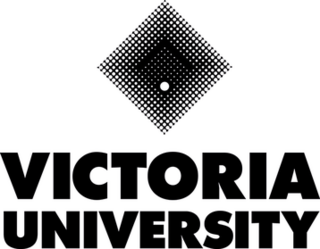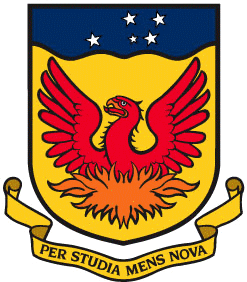
Victoria University is a public research university based in Melbourne, Victoria, Australia. It is a dual-sector university, providing courses in both higher education and technical and further education (TAFE).

The University of Adelaide is a public research university located in Adelaide, South Australia. Established in 1874, it is the third-oldest university in Australia. The university's main campus is located on North Terrace in the Adelaide city centre, adjacent to the Art Gallery of South Australia, the South Australian Museum, and the State Library of South Australia.

The University of South Australia (UniSA) is a public research university in the Australian state of South Australia. It is a founding member of the Australian Technology Network of universities, and is the largest university in South Australia with approximately 37,000 students.

The University of Melbourne is a public research university located in Melbourne, Australia. Founded in 1853, it is Australia's second oldest university and the oldest in Victoria. Its main campus is located in Parkville, an inner suburb north of Melbourne's central business district, with several other campuses located across Victoria.

The University of Southern Queensland is a medium-sized, regional university based in Toowoomba, Queensland, Australia, with three university campuses at Toowoomba, Springfield and Ipswich. It offers courses in law, health, engineering, surveying and built environment, the sciences, business, education, and the arts. The institution was established in 1969 as the Darling Downs campus of the Queensland Institute of Technology. In 1970, the institution had provided studying programs for rural Queensland and international communities. In 1971, it became the Darling Downs Institute of Advanced Education, then the University College of Southern Queensland in 1990 and finally the University of Southern Queensland in 1992. It operates three research institutes and seven research centres which focus on a wide range of business, agricultural, scientific, environmental, and technological issues.

WEHI, previously known as the Walter and Eliza Hall Institute of Medical Research, and as the Walter and Eliza Hall Institute, is Australia's oldest medical research institute. Sir Frank Macfarlane Burnet, who won the Nobel Prize in 1960 for his work in immunology, was director from 1944 to 1965. Burnet developed the ideas of clonal selection and acquired immune tolerance. Later, Professor Donald Metcalf discovered and characterised colony-stimulating factors. As of 2015, the institute hosted more than 750 researchers who work to understand, prevent and treat diseases including blood, breast and ovarian cancers; inflammatory diseases (autoimmunity) such as rheumatoid arthritis, type 1 diabetes and coeliac disease; and infectious diseases such as malaria, HIV and hepatitis B and C.

John Shine is an Australian biochemist and molecular biologist. Shine and Lynn Dalgarno discovered a nucleotide sequence, called the Shine-Dalgarno sequence, necessary for the initiation of protein synthesis. He directed the Garvan Institute of Medical Research in Sydney from 1990 to 2011. From 2018 to 2022, Shine was President of the Australian Academy of Science.

Monash University, Parkville campus is a campus of Monash University, located in Parkville, Victoria, Australia. It is home to the Faculty of Pharmacy and Pharmaceutical Sciences. Founded in 1881 and previously known as the Victorian College of Pharmacy, the faculty is the oldest school of pharmacy in Australia. A major centre of research and teaching, it is internationally regarded for its research in drug target biology and discovery, medicinal chemistry, drug development, formulation science, and medicine use and safety, including the discovery and development of the world's first successful anti-influenza drug, Relenza. In international rankings, it is ranked as the number one school of pharmacy and pharmacology in Australia and number two worldwide.
Adrienne Elizabeth Clarke is professor emeritus of Botany at the University of Melbourne, where she ran the Plant Cell Biology Research Centre from 1982 to 1999. She is a former chairman of the Commonwealth Scientific and Industrial Research Organisation, former Lieutenant Governor of Victoria (1997–2000) and former Chancellor of La Trobe University (2011–2017).
The Florey Medal, also known as the CSL Florey Medal and the Florey Medal for Lifetime Achievement, is an Australian award for biomedical research named in honour of Australian Nobel Laureate Howard Florey. The medal is awarded biennially and the recipient receives $50,000 in prize money.
The David Syme Research Prize is an annual award administered by the University of Melbourne for the best original research work in biology, physics, chemistry or geology, produced in Australia during the preceding two years, particular preference is given to original research to enhance industrial and/or commercial development.
The Australian Stem Cell Centre is an Australian medical research and development centre which focuses on regenerative medicine through the use of stem cells. Founded in 2003, the Centre is the National Biotechnology Centre of Excellence and has received over $100 million in funding in recent years. It is Australia's premier stem cell research organisation.

Ruth Frances Bishop was an Australian virologist, who was a leading member of the team that discovered the human rotavirus.

Douglas James Hilton is an Australian molecular biologist. He is the CEO of CSIRO and immediate past Director of the Walter and Eliza Hall Institute of Medical Research in Melbourne, Australia. His research has focused on cytokines, signal transduction pathways and the regulation of blood cell formation (hematopoiesis). Hilton was the President of the Association of the Australian Medical Research Institutes (AAMRI) from 2014-16.

Andrew Bruce Holmes is an Australian and British senior research chemist and professor at the Bio21 Institute, Melbourne, Australia, and the past President of the Australian Academy of Science. His research interests lie in the synthesis of biologically-active natural products and optoelectronic polymers.

Frances Separovic is a biophysical chemist and Distinguished Professor Emeritus of Chemistry at the University of Melbourne, where she taught physical chemistry and trained graduate students in her field. She is credited with developing techniques that utilise nuclear magnetic resonance spectroscopy (NMR) to study peptides in lipid bilayers, with applications in the study of the structure of membrane proteins and their effects on membranes. Her more recent research concerns 'the structure and interactions of amyloid peptides from Alzheimer's disease, pore-forming toxins and antibiotic peptides in model biological membranes'.
Jan Maree Tennent is an Australian scientist in the biomedical and animal health research sectors, and a member of the Australian Academy of Technology Science and Engineering.
Manju Sharma is an Indian biotechnologist and administrator of several scientific research and policy-making bodies in India. She was most recently the president and executive director at the Indian Institute of Advanced Research in Gandhinagar, Gujarat. She earlier served as the secretary, Department of Biotechnology, in the Indian Ministry of Science and Technology, and was awarded the Padma Bhushan in 2007.
Debasisa Mohanty is an Indian computational biologist, bioinformatician and a staff scientists at the National Institute of Immunology, India. Known for his studies on structure and function prediction of proteins, genome analysis and computer simulation of biomolecular systems, Mohanty is an elected fellow of all the three major Indian science academies namely the Indian Academy of Sciences, the Indian National Science Academy and the National Academy of Sciences, India. The Department of Biotechnology of the Government of India awarded him the National Bioscience Award for Career Development, one of the highest Indian science awards, for his contributions to biosciences, in 2009.

The ANU College of Health & Medicine is an Australian university college for the study of medicine, psychology, mental health, epidemiology and population health at the Australian National University (ANU), located in Canberra, the capital city of Australia.














